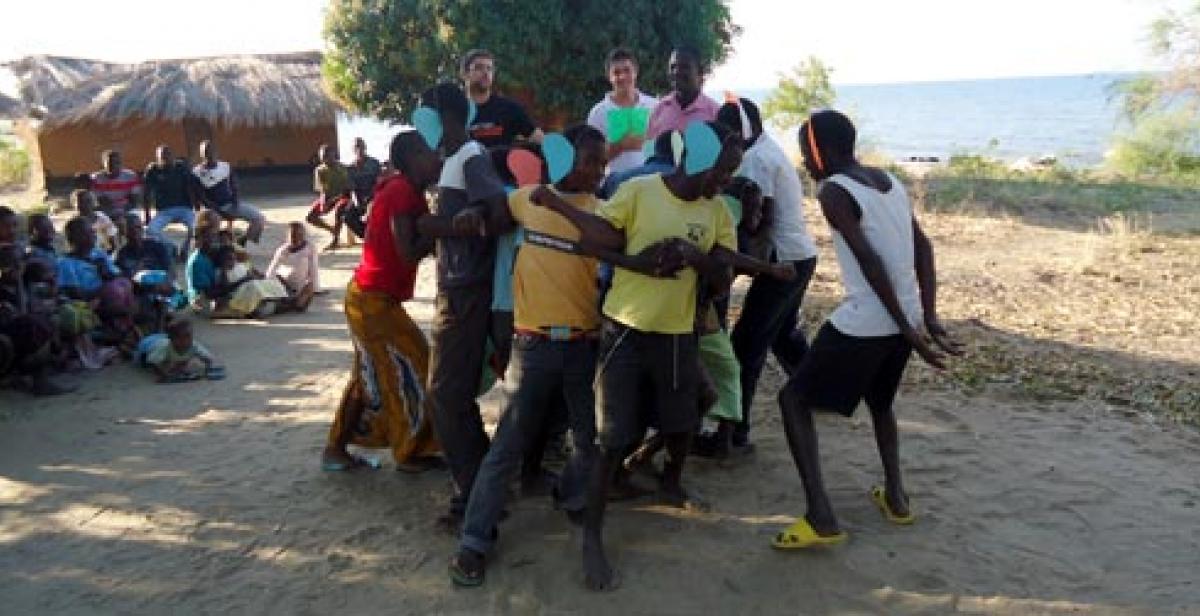By the Malawi ICS Empower team
On the 10th and 11th of August we did a workshop for the villages of Selemani and Kampanje respectively. These are both villages in the Lozi community, with a fairly even divide between those who are Christians and those who are Muslims.
In Selemani village we had 14 children and 33 people over the age of 14. In Kampanje village we had 23 children and 28 adults.
‘Moto Moto Moto’
We decided to begin with an energiser activity called ‘Moto Moto Moto’ which we were taught by our language teacher in Lilongwe. We thought this would be good to start with as we were told it was a fairly common Malawian game and some of the villagers would probably be familiar with it.
However, when we started the workshop in Selemani it soon became apparent that the villagers were not familiar with the game and the children, though enthusiastic, found it difficult to understand.
We learnt from this experience and, when we tried it the next day in Kampanje village, we decided to play it with some of the adults instead. Luckily they enjoyed the game and it ran smoothly.
‘Yes/No’
Next we tried another activity called the ‘Yes/No game’. We designated three people to represent the answers ‘yes’, ‘no’ and ‘not sure’ and asked them to stand separate from each other in front of the group.
We proceeded to ask basic questions about HIV and ARVs while the villagers moved to stand beside whichever person represented their answer. We then recorded the numbers of people standing by the person representing each answer.
Some of the results were shocking. For example, in Selemani, some people believed you couldn’t get HIV through unprotected sexual intercourse unless both parties had a bleeding cut on the genitalia, and a large majority thought you could get HIV through kissing.
This activity helped us to identify certain areas to target in the rest of the workshop.
In Kampanje the only question which the majority got wrong was thinking that ARVs cured HIV. This could either be because of a mistranslation of the question or because they had received conflicting information from various sources.
The ‘Elephant game’
In a response to these answers we moved on to the ‘Elephant game’ which presents a visual metaphor of the effect HIV has on the body and how ARVs boost the immune system.
One person was picked to be the ‘baby elephant’ (representing the human body). We then picked another eight volunteers to be ‘adult elephants’ who were there to protect the baby elephant (these represented the immune system).
Three ‘lions’ (representing various diseases and infections) were chosen to attack the adult elephants and attempt to get to the baby elephant.
Throughout the game we explained the metaphor and quizzed the villagers to make the game more interactive. We then introduced HIV to the mix by asking one of the volunteers to tap some of the adult elephants on the shoulder and take them out of the game.
After this we introduced the concept of ARVs. One of the volunteers, representing ARVs, was given the task of bringing the adult elephants back into their protective circle and thus restoring the metaphorical immune system.
The activity was very successful in both villages and the villagers were able to answer all our questions with ease.
Explaining the science
We followed this with a formal presentation of information about HIV and ARVs. We explained the science behind HIV and ARVs and used some practical demonstrations to show how the HIV virus replicates within white blood cells. Combining theory and practical methods seemed to work well in both villages.
We were very happy with the response of the villagers to this approach.
Another one of the volunteers covered the social side of HIV and ARVs by looking at ARV practices in the context of religion.
We finished the workshop by conducting questionnaires with both the adults and the children.
Photo: ICS Empower volunteers playing the 'Elephant game' with young people from the Lozi community in Malawi.



